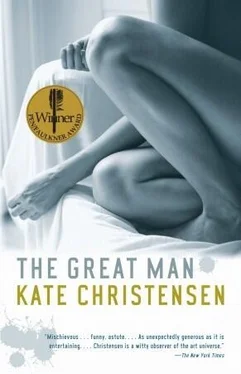“Chalk it up to a complete lack of interest,” said Maxine. “In children, you could say.”
“And in Teddy’s children especially.”
“It’s no secret,” said Maxine, “what I’ve always thought of her.”
“You’ve only said you don’t like her. You haven’t said why.”
Maxine declined to respond to this.
“Oscar was a complicated man,” said Henry. “A very different kind of man from me. I don’t judge him; in fact, I wish I were more like him. It’s an honor, writing his life, talking to his family.”
“I’m happy for you,” she said, standing up.
“Before I go,” said Henry without making a move to leave, “let me just say that I love your work. It makes me think of Franz Kline crossed with sumei painting — something about the powerful tension between control and wildness, your fluid and subtle but rigorous and tough-minded brushwork. Nothing sentimental, nothing extraneous, but what’s there feels both unerringly and passionately executed.” He took a hasty sip of tea. “I hope it’s all right that I said that.”
“Of course the Franz Kline comparison is music to my ears,” said Maxine. She was suddenly feeling a little more alert. “He was a great painter, an amazing painter. He influenced me in definite ways. And sumei painting, well, yes, of course sumei painting…I use Japanese brushes and techniques. But you wouldn’t tell a man his work was tough-minded. That’s something men say to women as a compliment, and it really means ‘masculine.’”
“You seem to have it in for men,” said Henry with a smile. “I’m used to it by now. My wife does, too.”
“I have nothing against men,” she replied. “I like men. Actually, I can’t stand most women, except the ones I’m attracted to. But I’ll be ninety in six years. I’ve had plenty of time to observe a few things.”
“I meant that your work is tough-minded,” said Henry, “like Kline’s. There is a similar achievement of absolute beauty without wishful thinking.”
Maxine cleared her throat. “Thank you,” she said against the upswell of words in her throat: I was always a much better painter than my brother; it was just that I was quiet. I didn’t make waves. I was never comfortable with interviews, publicity, all that. I just painted. Oscar was a showman, a charmer, an attentionmongerer, a flirt, even as a little boy, and I was a good girl, and look where it got me…. I never learned to play the game; I just waited on the sidelines for someone to notice me and see me for what I was, like the peasant girl in the fairy tale.
“Thank you so much for your time today,” said Henry. He bounced Chester a little in his arms, preparing to wrap him up and carry him back down to the car.
“The truth is, I’ve always felt like the peasant girl in the fairy tale,” said Maxine. It came out sounding strangled.
Henry closed his notebook and put it into his shoulder bag. “What do you mean?”
“Oh,” she said. “Just kvetching.”
“Why would you feel like a peasant girl?”
Maxine warmed to the surprise in his voice and felt her opposition to his questions soften a little, like slightly warmed wax. “There’s only so much fame that comes to those who don’t make themselves notorious in some way,” she said. “My greatest mistake was not allowing an aura of scandal around my name. I’m queer, as they say now — you’d think I could have turned that to my own advantage, but I’ve always been so naïve about those things, making the personal public, and vice versa. It’s not that I don’t have secrets. I have some great secrets. I just always preferred not to tell them.”
She walked off to the studio area of the loft, lifted something from a bowl on a table and looked at it, then set it down again and wandered absently from one table to another, patting the surfaces, fingering other objects — a brush, a glass, a charcoal pencil. Henry had taken his notebook out again.
“I admit I’m genuinely surprised to learn that you imagine yourself to be in the shadow of your brother. Do you not see him as all but forgotten now?”
He put his pen down. As he waited for Maxine to say more, he glanced around her small living area. She had cordoned off about two hundred square feet when she’d first moved in, forty-odd years before. Flanking one corner, in the kitchen area, were a deep enamel sink, a gas stove, a Formica counter atop two side-by-side floor cupboards with two wall cupboards above, and a refrigerator. On a shelf by the stove, the spices were arranged meticulously, as if she’d bought them, lined them up like knickknacks, and forgotten them except to dust them every so often. The pots hanging above the stove gleamed with disuse, and the countertop had not one crumb on it. In the middle of the kitchen was the large oak table where Henry sat, its surface scarred with dark cuts and small burn marks, which made Henry imagine a tableful of drunken artists sitting around with cigarettes and penknives. Dividing the kitchen from the sleeping area was a hanging Persian tapestry curtain, open now. Looking past it, Henry saw a neatly made bed, two bureaus, and a wardrobe. Against the opposite wall were a beat-up red couch and a large bookshelf that contained, among other things (he knew from his last visit, when he’d scrutinized it while she was in the bathroom), novels by the likes of Williams Gass and Gaddis, art books (along with the more obvious Kline and Kandinsky, Matisse and Fragonard appeared, inscrutably and incongruously — a master of the cutout and a rococo lightweight?), and, it appeared, every book about Sherlock Holmes ever written. Her living quarters were uniformly shipshape and orderly, but Maxine clearly had given extreme precedence to her work over her life; her studio sprawled over fifteen hundred or so square feet. Last time he’d been here, it had been a dismaying jumble, but today it bristled with cleanliness.
“Oscar’s success was not really about how good a painter he was,” said Maxine. “His women were so outrageously plural, so literally sexualized…. Looking at his paintings is like looking at the outward manifestation of his dick. Pardon my language. But it’s smutty, his work…. He fucked them with brushes. Even his own daughters as little girls. Scandalous. Brilliantly scandalous. Now no one gives a shit, but back then, it was a big, loud, bold statement. He was a good-enough painter to make some real waves. Clement Greenberg loathed him. He once wrote in a review, ‘Feldman hammers the same anachronistic note over and over, badly and off-key.’ Oscar just laughed. He liked being hated by Greenberg. He found it perversely flattering.”
“Greenberg also hated Oscar’s dealer, Emile Grosvenor.”
“He blacklisted the Grosvenor Gallery,” said Maxine, “so Emile moved his paintings to Grosvenor West. Oscar’s work sold in California through the sixties and early seventies. Back then, his biggest collectors were Hollywood directors and producers, the Roman emperors of their time.” She held up a small white object to the light, showing Henry, who squinted at it, unable to make out what it was from that distance. “This is a shark’s tooth. I use it to scrape lines in paint when I need fine definition. I like the idea of a shark’s tooth, but it also makes distinctive marks I can’t get any other way.”
“You used it in Night of the Radishes ?” asked Henry. This was easily the best-known of her works. It was a triptych completed in 1967, which now hung at the Modern and was generally considered her masterpiece: Over three panels were amorphous blooms of black paint and razorlike black projectiles, a juxtaposition that had served through the decades as an aesthetic Rorschach test for feminist scholars, Marxist art historians, Freudian and Jungian art theorists, postmodernists, and various other-ists, who’d invested it with whatever qualities best suited their ends. Henry thought Maxine’s work was beautiful but stringently monochromatic, despite what he’d said to her earlier, but even he couldn’t deny that Night of the Radishes was the real thing, possibly a great work of art.
Читать дальше












